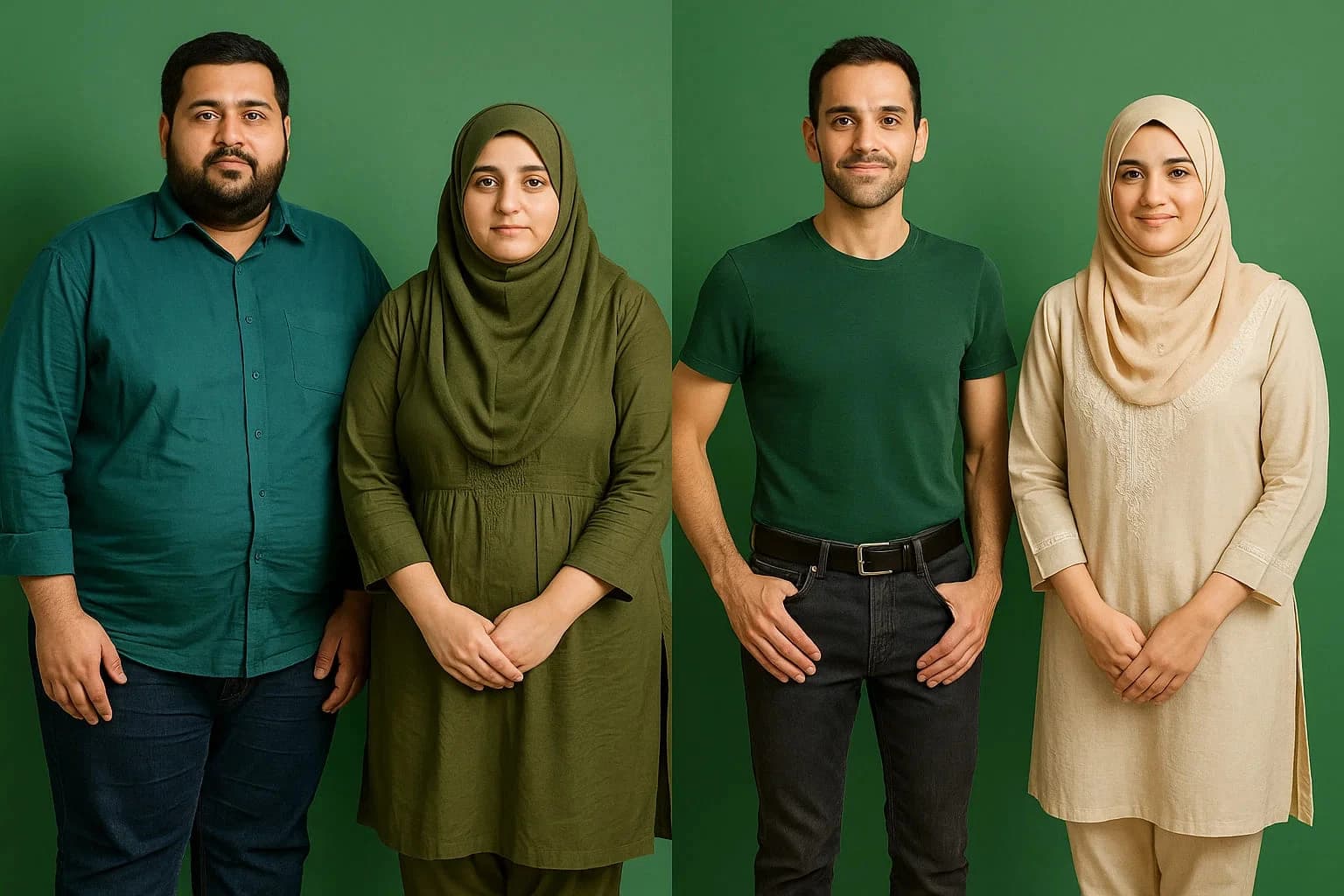© 2025 Roz UpdatesbyTETRA SEVEN

* All product/brand names, logos, and trademarks are property of their respective owners.
In the heart of Pakistan’s bustling urban centers—Karachi, Lahore, and Islamabad—a quiet revolution is taking place at the dinner table. Once dominated by hearty, meat-heavy dishes and gluten-rich staples like naan and roti, the urban Pakistani diet is undergoing a significant transformation. The growing interest in plant-based and gluten-free diets is not just a passing health fad—it reflects deeper changes in awareness, lifestyle, and access to global food trends.
Fuelled by rising rates of diabetes, gluten intolerance, obesity, and general wellness awareness, many Pakistanis—particularly millennials and Gen Z in urban areas—are exploring alternative diets. Plant-based eating, long associated with vegetarian cultures abroad, is now finding local resonance as consumers look for ways to reduce cholesterol, improve digestion, and support ethical food choices. Meanwhile, the gluten-free movement has gained traction both among medically diagnosed individuals (such as those with celiac disease) and a broader group of people seeking to address bloating, fatigue, and other food sensitivities.
This shift is not happening in isolation. The increasing availability of almond flour, gluten-free atta, vegan-friendly cafes, and online nutrition coaches has made alternative eating more accessible than ever. Social media influencers and Pakistani celebrities are also promoting health-focused lifestyles, making these diets aspirational and trendy.
This blog explores the rise of plant-based and gluten-free diets in urban Pakistan—why they’ve gained popularity, how they are being adapted to local culture, and what challenges and opportunities lie ahead. Whether you’re curious about chickpea curry without ghee or gluten-free parathas that taste like the real deal, this deep dive will help you understand one of Pakistan’s most intriguing modern food trends.
Plant-based diets are increasingly embraced in urban Pakistan for their reputed health benefits. These diets emphasize fruits, vegetables, legumes, whole grains, nuts, and seeds—minimizing or eliminating animal products. For many Pakistanis, this shift is motivated by goals such as weight management, reducing cholesterol, and preventing lifestyle diseases like diabetes and hypertension. Studies globally and regionally support the health advantages of plant-based diets, including improved heart health and digestive efficiency. However, nutritional planning is essential—to avoid deficiencies in B12, iron, and protein, many nutritionists in Pakistan now offer tailored guidance for vegetarians and vegans.
The rise of veganism and sustainable eating worldwide has impacted food choices in Pakistan, particularly among educated, middle- to upper-class urban dwellers. Movements like “Meatless Monday” or “Veganuary” are gaining ground in wellness communities. Yet, the real magic lies in local adaptation. Traditional dishes like daal, chana masala, sabzi, and baingan bharta naturally align with plant-based values. By tweaking oils or avoiding ghee, these meals become not just familiar but also healthier. Plant-based versions of biryani, haleem, and even seekh kebabs are now common in social media recipes and restaurant menus.
Urban centers have become hotspots for plant-based innovation. Restaurants like Evergreen (Karachi), Rina’s Kitchenette (Lahore), and Neco’s Natural Cafe are increasingly offering vegan-friendly menus and dairy-free desserts. Grocery stores stock almond and soy milk, tofu, flax seeds, and gluten-free whole grains. Online platforms like Organic Bar and HealthSolution.pk cater to a growing demand for organic, plant-based ingredients. This shift reflects not just a dietary change, but a broader cultural movement towards conscious living and holistic health.
The emergence of plant-based diets in Pakistan is no longer niche. It’s a growing movement supported by evolving preferences, increased access, and a desire for sustainable, health-conscious lifestyles.
Gluten—a protein found in wheat, barley, and rye—is a dietary staple in most Pakistani households, thanks to the widespread consumption of roti, naan, paratha, and baked goods. However, awareness about gluten intolerance and celiac disease is gradually increasing in urban Pakistan. While exact national statistics are lacking, a growing number of individuals report symptoms like bloating, fatigue, and digestive discomfort linked to gluten. Medical professionals in cities now more frequently screen for celiac disease and gluten sensitivity, leading to a small but rising number of formal diagnoses.
In response to this shift, a niche market for gluten-free products has emerged, particularly in cities like Karachi, Lahore, and Islamabad. Grocery chains such as Al-Fatah and Springs Mart have started stocking gluten-free atta, rice flour, quinoa, gluten-free pasta, and baking mixes. Specialty stores and online platforms like Vital Organics and Ayubia Organics offer imported and locally sourced gluten-free alternatives. Additionally, cafes and restaurants are adapting by offering gluten-free menu options, such as millet rotis or almond flour desserts, catering to a clientele that now actively asks for these items.
Despite its growing presence, following a gluten-free diet in Pakistan comes with challenges. First, labeling standards are inconsistent, making it difficult to trust product claims. Second, gluten-free goods are often significantly more expensive than their conventional counterparts, limiting access for many. Finally, cultural and social settings—like weddings or dawat invitations—rarely accommodate gluten-free needs, leading to dietary isolation. Education and broader awareness are still needed to support those managing medical conditions through gluten-free living.
While still a developing market, the demand for gluten-free options in urban Pakistan signals a broader shift towards personalized nutrition and digestive wellness. As awareness grows, so will the infrastructure to support these needs more inclusively.
Pakistan’s rich culinary heritage is built on hearty, flavorful meals often centered around meat, ghee, and wheat-based staples. Yet, urban households are finding creative ways to adapt traditional recipes for modern dietary needs. For plant-based diets, meat dishes like kofta, keema, and biryani are now made with lentils, mushrooms, or soy protein. Gluten-free rotis made from jowar, bajra, or almond flour are replacing conventional wheat chapatis in health-conscious kitchens. Even sweets like kheer and halwa are being recreated with oat milk, coconut sugar, and gluten-free ingredients. These modifications show that Pakistani cuisine can evolve without losing its cultural essence.
Socially, diet trends like plant-based and gluten-free eating are still met with mixed reactions. While younger, urban populations increasingly view these choices as health-forward and progressive, older generations may see them as restrictive or foreign. There’s a lingering perception that not eating meat regularly equates to weakness or lack of nourishment. Gluten-free eaters often struggle to explain their dietary needs in gatherings, with skepticism ranging from “It’s just a trend” to “You’re missing out.” However, the tide is slowly turning, as awareness spreads and people experience benefits firsthand.
Platforms like Instagram, YouTube, and TikTok are instrumental in normalizing and popularizing alternative diets in Pakistan. Influencers such as Mahnoor Sheikh, Sana Zehra, and Hina Asad regularly share gluten-free recipes, plant-based meal plans, and their personal health journeys. These digital narratives make such diets seem more accessible and relatable. Viral videos, testimonials, and diet challenges further reinforce community support, especially among youth seeking healthier lifestyles.
Dietary changes in Pakistan are not just nutritional—they're cultural. As traditional values intersect with global wellness trends, urban Pakistanis are carving out a new, inclusive food identity that respects heritage while embracing health.
Transitioning to a plant-based or gluten-free lifestyle in Pakistan doesn’t have to mean giving up cultural favorites or breaking the bank. For beginners, the key is gradual substitution. Start by swapping one meal a day with a plant-based alternative or replacing wheat roti with a gluten-free flour like bajra or jowar. Batch cooking lentils, beans, and gluten-free grains like quinoa or rice helps maintain variety and consistency. Shopping at health stores or farmers' markets, and exploring online resources like Pakistani vegan Facebook groups, can also provide meal ideas, product tips, and encouragement from others on the same journey.
Although dietary changes can bring significant health benefits, it’s crucial to consult a qualified nutritionist or medical professional before making major shifts. For those with gluten sensitivity or suspected celiac disease, proper diagnosis and follow-up are essential to prevent nutrient deficiencies. Similarly, a poorly planned plant-based diet can lead to shortfalls in B12, iron, calcium, and omega-3s. Urban Pakistan now boasts a growing network of dietitians familiar with alternative diets—some even offer virtual consultations—making it easier than ever to create a personalized, nutritionally sound meal plan.
Pakistanis transitioning to alternative diets often worry about losing traditional flavors. Fortunately, many local dishes are inherently adaptable. Daal, sabzi, rice pulao, and chutneys are naturally plant-based and can be enhanced with spices, herbs, and healthy fats. For gluten-free adaptations, chefs are using rice flour, cornmeal, and chickpea flour to recreate familiar textures and tastes. The trick is to honor cultural roots while experimenting with modern health innovations, creating meals that are both satisfying and health-forward.
Transitioning to an alternative diet is a personal journey that can be both empowering and culturally enriching. With the right support, preparation, and mindset, urban Pakistanis are proving that healthy eating and heritage can go hand in hand.
As the culinary landscape of urban Pakistan evolves, so too does the nation’s approach to wellness and nutrition. The rise of plant-based and gluten-free diets is a clear reflection of this shift—a move away from rigid, one-size-fits-all eating patterns toward more personalized, health-conscious choices. What was once seen as niche or foreign is now increasingly mainstream, driven by health concerns, global awareness, and the growing influence of digital media.
Across Karachi, Lahore, and Islamabad, more people are opting for meatless Mondays, gluten-free rotis, and oat milk lattes—not as a rejection of tradition, but as an integration of modern health goals with cultural values. From modified family recipes to influencer-driven meal plans, urban Pakistanis are embracing flexibility and innovation in their diets. This shift is not only enhancing physical well-being but also sparking broader conversations about sustainability, food ethics, and holistic living.
Yet, challenges remain: access, affordability, and misinformation can hinder progress. That’s why it’s essential for individuals to educate themselves, seek professional guidance, and adapt at their own pace. The key is balance—nourishing the body while honoring the rich flavors and customs that define Pakistani cuisine.
In the end, whether it’s a gluten-free biryani or a plant-based karahi, the future of food in Pakistan is not about giving up—it’s about growing up. One plate at a time.

9 October 2025

23 September 2025
No comments yet. Be the first to comment!